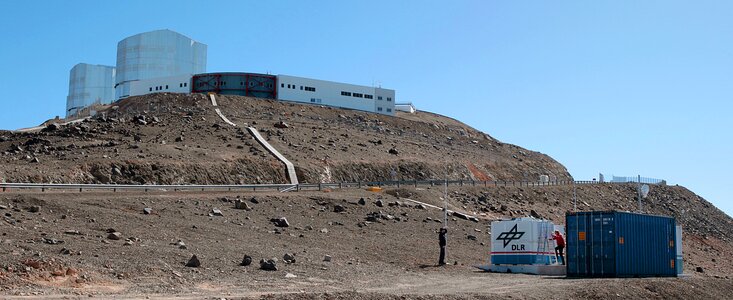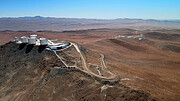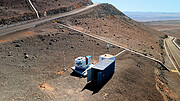Annuncio
Looking for tsunami clues in the skies above Paranal with OASIS
30 Aprile 2024
As part of a collaboration between the German Aerospace Center (DLR) and ESO, the Observations of Airglow with Spectrometer and Imager Systems (OASIS) project has officially joined the ranks of ESO’s Paranal Observatory. Best known for hosting world-leading astronomical observatories, like ESO’s Very Large Telescope, Paranal also happens to be ideally suited for certain atmospheric observations. Operated by DLR and hosted by ESO, OASIS aims to show that monitoring “airglow” in our atmosphere has potential to provide early warnings for tsunamis.
Tsunamis, giant waves caused mostly by earthquakes under the sea, are a destructive force of nature that can result in a significant loss of life and damage to infrastructure. OASIS aims to show that it is possible to mitigate some of the impacts of these natural hazards by monitoring our atmosphere. Earthquakes generate sound waves that travel upwards through the atmosphere. These perturbations affect the so-called airglow or nightglow — the natural emission of molecules high up in the atmosphere. OASIS will monitor this airglow, specifically the emission from hydroxyl molecules at a height of around 86 km, which could eventually be used to issue tsunami early warnings.
Paranal is uniquely suited to observing the atmosphere due to its special environmental and climate conditions. Chile’s Atacama Desert, where Paranal is located, boasts a uniquely dry climate ideal for both astronomical and atmospheric observations. Chile is also close to two tectonic plate boundaries that often produce strong earthquakes, including some that generate tsunamis.
As a side effect of monitoring airglow on a given night, OASIS also has the potential to benefit its neighbouring telescopes. Airglow appears as a dim glow that prevents the night sky from being entirely dark, which can affect observations from ground-based telescopes. While methods exist to account for it, airglow is a complex and constantly changing phenomenon. The regular airglow monitoring data OASIS will collect could be used to help forecast the airglow brightness on a given night, with potential to eventually help ESO better account for airglow in astronomical observations and optimise the use of telescope time.
The inauguration of OASIS took place late last week, more than a year after the first test observations were obtained by OASIS instruments. As part of the inauguration event, DLR and ESO staff came together at Paranal for general presentations on the project followed by a roundtable discussion on cooperation opportunities.
Links
Contatti
Alain Smette
ESO Staff Astronomer
Paranal, Chile
Tel: +56 2 2463 3113
Email: asmette@eso.org
Patrick Hannawald
DLR German Remote Sensing Data Center, Atmosphere
Weßling, Germany
Tel.: +49 8153 28-3566
Email: Patrick.Hannawald@dlr.de
Bárbara Ferreira
ESO Media Manager
Garching bei München, Germany
Tel: +49 89 3200 6670
Email: press@eso.org
A proposito dell'annuncio
| Identificazione: | ann24006 |
Our use of Cookies
We use cookies that are essential for accessing our websites and using our services. We also use cookies to analyse, measure and improve our websites’ performance, to enable content sharing via social media and to display media content hosted on third-party platforms.
ESO Cookies Policy
The European Organisation for Astronomical Research in the Southern Hemisphere (ESO) is the pre-eminent intergovernmental science and technology organisation in astronomy. It carries out an ambitious programme focused on the design, construction and operation of powerful ground-based observing facilities for astronomy.
This Cookies Policy is intended to provide clarity by outlining the cookies used on the ESO public websites, their functions, the options you have for controlling them, and the ways you can contact us for additional details.
What are cookies?
Cookies are small pieces of data stored on your device by websites you visit. They serve various purposes, such as remembering login credentials and preferences and enhance your browsing experience.
Categories of cookies we use
Essential cookies (always active): These cookies are strictly necessary for the proper functioning of our website. Without these cookies, the website cannot operate correctly, and certain services, such as logging in or accessing secure areas, may not be available; because they are essential for the website’s operation, they cannot be disabled.
Functional Cookies: These cookies enhance your browsing experience by enabling additional features and personalization, such as remembering your preferences and settings. While not strictly necessary for the website to function, they improve usability and convenience; these cookies are only placed if you provide your consent.
Analytics cookies: These cookies collect information about how visitors interact with our website, such as which pages are visited most often and how users navigate the site. This data helps us improve website performance, optimize content, and enhance the user experience; these cookies are only placed if you provide your consent. We use the following analytics cookies.
Matomo Cookies:
This website uses Matomo (formerly Piwik), an open source software which enables the statistical analysis of website visits. Matomo uses cookies (text files) which are saved on your computer and which allow us to analyze how you use our website. The website user information generated by the cookies will only be saved on the servers of our IT Department. We use this information to analyze www.eso.org visits and to prepare reports on website activities. These data will not be disclosed to third parties.
On behalf of ESO, Matomo will use this information for the purpose of evaluating your use of the website, compiling reports on website activity and providing other services relating to website activity and internet usage.
Matomo cookies settings:
Additional Third-party cookies on ESO websites: some of our pages display content from external providers, e.g. YouTube.
Such third-party services are outside of ESO control and may, at any time, change their terms of service, use of cookies, etc.
YouTube: Some videos on the ESO website are embedded from ESO’s official YouTube channel. We have enabled YouTube’s privacy-enhanced mode, meaning that no cookies are set unless the user actively clicks on the video to play it. Additionally, in this mode, YouTube does not store any personally identifiable cookie data for embedded video playbacks. For more details, please refer to YouTube’s embedding videos information page.
Cookies can also be classified based on the following elements.
Regarding the domain, there are:
- First-party cookies, set by the website you are currently visiting. They are stored by the same domain that you are browsing and are used to enhance your experience on that site;
- Third-party cookies, set by a domain other than the one you are currently visiting.
As for their duration, cookies can be:
- Browser-session cookies, which are deleted when the user closes the browser;
- Stored cookies, which stay on the user's device for a predetermined period of time.
How to manage cookies
Cookie settings: You can modify your cookie choices for the ESO webpages at any time by clicking on the link Cookie settings at the bottom of any page.
In your browser: If you wish to delete cookies or instruct your browser to delete or block cookies by default, please visit the help pages of your browser:
Please be aware that if you delete or decline cookies, certain functionalities of our website may be not be available and your browsing experience may be affected.
You can set most browsers to prevent any cookies being placed on your device, but you may then have to manually adjust some preferences every time you visit a site/page. And some services and functionalities may not work properly at all (e.g. profile logging-in, shop check out).
Updates to the ESO Cookies Policy
The ESO Cookies Policy may be subject to future updates, which will be made available on this page.
Additional information
For any queries related to cookies, please contact: pdprATesoDOTorg.
As ESO public webpages are managed by our Department of Communication, your questions will be dealt with the support of the said Department.




